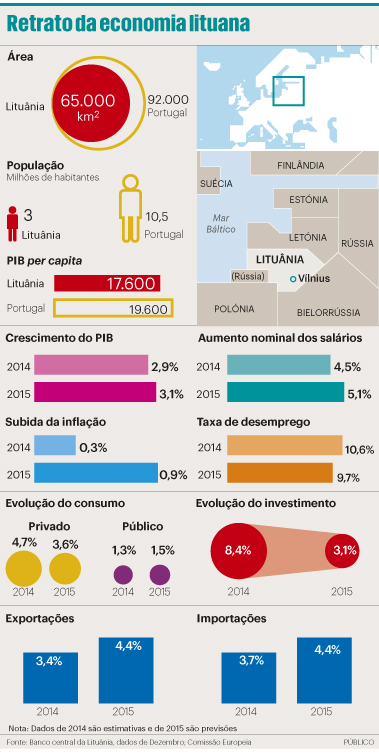The first euro banknotes reached the boat Lithuania on 23 October, but only now is beginning to be used to the detriment of the national currency, the litas (with each euro worth 3.45 litas). Manufactured in the German central bank, weighed 114 tons, worth 132 million euros, and were transported in secret for security reasons. Stored in bank vaults, now is the time to start a new journey, through the hands of Lithuanian, spreading after the rest of the euro area, starting this Thursday, is composed of 19 member countries.
This may seem an odd situation for a ne w membership of the single currency, as the euro zone is at risk of entering into deflation and return to suffer a recession, while the rules impose tight controls at the level of public debt (below 60% of GDP) and the deficit (must be below 3% of GDP). However, for Lithuania, which had tried to join the euro in 2007, this seems the most logical step, especially with a neighbor like Russia.
Speaking to PUBLIC, Mauricas Zygimantas, chief economist at Nordea Bank of Lithuania and professor at the University of Management and Economics (ISM) of Vilnius, points out that joining the euro strengthens links to the West and will bring economic benefits to the country. “The euro is another step in the direction” of Western Europe, which emphasizes, is “prosperous, democratic, tolerant and transparent”, and another step to distance itself from Eastern Europe, “impoverished, autocratic, intolerant and corrupt”.
In this context, he adds, the euro “can be seen as the continuation of a long journey back to the meeting of Western civilization, which began in 1990 after Lithuania regaining independence from the Soviet Union, and culminated in 2004 with the accession to the European Union and NATO. ” To Mauricas Zygimantas, the economic and financial crisis in Russia makes this even more appealing movement, while the military conflict in Ukraine recalls the great virtue of the European Union: peace. This at a time when Lithuania is strengthening the expenses for the defense of the area.
Then, leaving aside the comparisons east / west, Mauricas Zygimantas points out that the single currency has “several benefits to offer” highlighting four key elements: facilitating the free movement of goods, services, people and capital, enhancing the benefits of the single market; eliminates risks that still remained of currency devaluation (despite the litas orbit with the euro since 2002); allows to influence the European Central Bank’s policies; and will facilitate trade, investment and tourism between the three Baltic countries.
Estonia and Latvia use, respectively, the single currency from 2011 and 2014 (Latvia was the latest member), and the entry Lithuania puts the country on a par with the two neighbors, and represents the end of a period in which each of the small Baltic country had its own currency.
PUBLIC, Algirdas Miskinis, responsible for economic policy department of the Faculty of Economics, University of Vilnius, also points out that joining the euro is “an attempt of a small country become more visible in the European Union and the rest of the world.” In addition, he says, “there are strong economic arguments” to enter the single currency, such as access to cheaper funding, ease of payment, cheaper transactions and more foreign direct investment.
Challenges for front
Not everything, however, are only advantages, and Lithuania will have many challenges ahead. Algirdas Miskinis highlights two of them: the economic growth, “which is to slow down due to the Russian embargo and slight growth in the European Union”, and the social, as “wages are low and inequality is quite high.” For now, it is estimated that in 2015 wages grow above inflation, increasing real wages, which makes some analysts issuing warnings about the risk of the country’s competitiveness loss.
Moreover, Algirdas Miskinis considers that neither the public debt or inflation are problems, and that the public deficit is under control, although “due to low salaries and pensions.” According to data of December of the Bank of Lithuania, domestic demand and exports will grow less than initially estimated, mainly due to the Russian embargo on food products, which represent 38% of sales in the country to foreign goods.
Have Mauricas Zygimantas stresses that the major challenge of the country will not fall into the trap of “post-euro euphoria” and continue to “monitor the levels of private sector debt and the public sector.” For now, he says, the examples of Estonia and Latvia are “very encouraging”, since the two countries have the lowest public deficits of the European Union. For now, the Lithuanian state budget for the next year, the first of life in euro, points to a public deficit of 1.2% of GDP, with the economy to grow 3.4%.
With the accession of Lithuania, the euro area closes a cycle of growth, without any further EU country on the waiting list. In 2002, when it gave the big kick-off, entered 12 countries at once, Portugal included. After that, it took until 2007 for the single currency club to grow again, with Slovenia, and it took nine years to move from 12 to 19 countries, when there are 29 in the EU.
Despite be no expectation that the euro becoming the currency of all Member States, as an inevitable step, the UK is proof that there is hardly a single currency for all countries. Others, like Poland, have tested various approaches, but continued with the local currency and without power vests in the deficit.
Silvia Merler, the think tank Bruegel, told PUBLIC that “no one can say at this time which will be the next country to join “the euro, or when. This researcher points out, however, that after the appointment of Polish former prime minister, Donald Tusk, president of the European Council, new speculation about the entry of this country in the single currency club. But even if this happens, stresses, “it will take some time.”

No comments:
Post a Comment